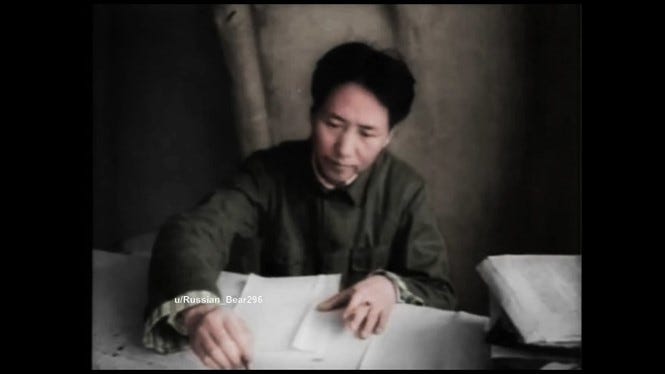The Long March
[a shih in seven-word regular, Chi Lu]
[translated by Nancy Lin]
To men of the Red Army
Long marches are no daunts.
Tame are mountains and rivers
For all their parading thousands.
The sprawling Rocky Five
Seem but wavelets
That dance and frisk;
The massive sweeps of Wumeng
Skip lightly by –
Rolls of clay beads.
Now the Golden Sand
Laps the cloud-topped cliffs
With its warm wash;
Now the iron chains
Steal over the Grand Ferry
In an icy gleam.
Loveliest of all
Is the Minshan snow,
Glowing a thousand li across
As our three forces march smiling through.
Notes [by Nancy Lin]
Starting from Kiangsi-Fukien bases in October 1934, the main body of the Red Army fought its way through Kwangtung, Hunan, Kwangsi, Kweichow, Szechuan, Yunnan, Sikang and Kansu, and reached north Shensi in October 1935. There it was finally joined by the Second and Fourth Front Armies, resulting in the establishment of the new center of Red power at Yenan.
“Has history ever witnessed a long march such as ours?” said Mao in December 1935. “For 12 months we were under daily reconnaissance and bombing from the skies by scores of planes, while on land we were encircled and pursued, obstructed and intercepted by a force of several hundred thousand men, and encountered untold difficulties and dangers on the way: yet by using our two legs we swept across a distance of more than 25,000 li through the length and breadth of eleven provinces. Has history, we ask, ever known a long march to equal ours?” Commenting on the significance of the March, Mao continued: “It is a manifesto, a propaganda campaign, a seeding machine … It has announced to some 200 million people in the eleven provinces that the road of the Red Army is their only road to liberation.”
The Rocky Five (Wu Ling) refer to the chain of mountains running through the 4 provinces of Kiangsi, Hunan, Kwangtung and Kwangsi – so-called because of its five particularly well-known ranges.
Wumeng: one of the highest mountain ranges in the Yunnan-Kweichow plateau that overlooks the Golden Sand River on the north.
The Golden Sand (Chinsha River) is the name given to the sector of the upper Yangtse that flows through the western parts of Szechuan and Yunnan.
The Grand Ferry (Tatu River) is in west Szechuan with its famous bridge at Luting made of 13 iron chains with moveable planks for floors spanning 300 feet across, over rushing torrents. The Red Army succeeded by dint of audacity and deception tactics in crossing the Golden Sand in early May 1935 and effecting a spectacular forced passage over the Luting Bridge at the end of the same month.
Meantime, dissension had emerged within the CPC over the destination of the Long March. It was only at a Party conference at Maoerkai (in north Szechuan) in August 1935 that Mao’s insistence on driving to Shensi definitely prevailed over Chang Kuo-tao’s advocacy of retreating to Sikang. The decision had far-reaching ramifications. For the Japanese aggression had by then penetrated within the Great Wall, and only by establishing a base up north was the Red Army in a position to reach out to the rest of north China and then on to central China and the northeast and create an extensive network of resistance behind the Japanese lines – what eventually made possible the success both of the war of resistance and the war of liberation.
From Maoerkai, the Red Army resumed their march north. By mid-September, it crossed Minshan, the massive range on the Szechuan-Kansu border with peaks of perpetual snow.
‘The Three Forces’ mentioned in the concluding line refer to the main Red Army (i.e. the First Front Red Army which Mao was leading) and the Second and the Fourth Front Red Armies which had come across by different routes.
“With the crossing of Minshan”, said the poet in 1958, “a bright unobstructed vista emerged. We had rounded the corner to the opposite phase, with verily ‘shady willows and glowing flowers ushering forth a new village’. The few poems that follow reflect this mood.”
This poem, written in the last days of September 1935, is said to have been read personally by the poet at a meeting of military cadres at Tungwei, Kansu, to the rousing cheers of the audience.
[next - 16. Kunlun]



